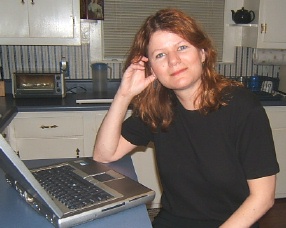 |
|

with Jacqueline Tucker
<><><><><><><><><><><><><><><><><><><><>
Like any social or scientific phenomenon, technology has its share of myths and misconceptions. And similar to most myths, some have their origins in fact, while others are simply the byproduct of our fears and biases. Let's examine some of our more prevalent technophobic misconceptions and see if we can clean our collective conscience of these prejudices.
Technology Automates People Out of Jobs
From the industrial revolution of the early 1900s to the advent of the personal computer much later in the century, people have often believed that technology costs people their jobs. Upon closer inspection, however, this myth appears not only to be untrue, but that technology has actually had the opposite impact on the job market. While it may be true that technical advances have displaced some former occupations, technology in and of itself -- especially computer technology -- not only has spawned new jobs, but an entire industry on which to base one's career.
The early days of computer technology were reserved for either the technically brilliant or for largely unskilled labor whose primary job entailed feeding punch cards into machines or typing streams of data into primitive consoles.
Now there is a mind-boggling array of technology positions to choose from that span the entire skill and experience spectrum. These include computer operations, programming and repair, as well as computer education, sales, and support, etc. It has also spawned a large management infrastructure that requires little (if any) technical expertise, including information technology senior management which is attracting an increasing number of non-technical professionals.
Technology Makes People Anti-Social
Of all the myths, this one surprises me the most. In an era of electronic mail, cell phones, text messaging and other handheld devices, people are communicating with each other more often -- and from more places -- than ever before and are often holding more than one conversation at a time. Years ago, it would have been considered the height of rudeness to open a newspaper in the middle of a discussion or business meeting, or to take a non-urgent phone call. It is now not only socially acceptable but normal to peruse your e-mail and answer text messages and cell phone calls in the strangest of places and social situations.
Electronic unavailability is often viewed as a lapse in one's social responsibilities, so people often feel obligated to respond to the beep, ring or other electronic call to arms. If nothing else, technology has made it socially acceptable to be rude in the name of instant accessibility. Legislation and rules have been enacted to help manage this social phenomenon, including the largely ignored law prohibiting the use of "hands on" cell phones while driving, and homemade signs at retail checkout counters forbidding the use of cell phones while placing your order. People need to communicate with each other so much and so often now that they must be implored to mind their manners by their local coffee shop.
Technology Is Expensive
Computers are no longer considered luxuries or insanely expensive holiday gifts for children. They've become standard household appliances, and therefore should be considered within that paradigm.
The cost of technology follows the same pattern as any high-end consumer product, where the initial high price of a newly released product decreases over time as it transitions from proprietary specialty item to mainstream commodity. You can now purchase a basic desktop computer for less than $500, no more expensive than a high-end typewriter back in the days of correction tape. Like any extensible consumer item, the price of a computer will increase along with the additional bells and whistles you want. The price of a refrigerator is quite reasonable until you begin adding automatic ice makers, coldwater dispensers and the like. The same principle applies to computers and other technology purchases. The sticker shock of opening your monthly phone bill is largely not attributable to your basic phone service, but the add-ons that we feel we must have such as call waiting, voice mail and, of course, Internet access.
Technology Is Complicated and Difficult to Learn
The basic use of a computer, cell phone or other handheld device is really not all that hard to learn. In fact, it's easier to type a letter on a computer than on a typewriter because you can make as many mistakes as you like, and obliterate them with the backspace key -- no need for correction tape, liquid paper and painfully lining up the type spacing.
I think this misconception is largely because people often confuse the use of a computer with its internal operations. But you do not need to know how your computer works (or how to repair it) any more so than you do your TV, washing machine or refrigerator. Just use it until it breaks and then call the technical version of the Maytag repairman when it malfunctions.
Some people argue that computers break more often than these other types of electronic equipment, but it's important to remember that we also do not change these other commodities as often as we do a computer. Imagine if we added on features to our refrigerators as often as we install new software programs or hardware gadgets on our computers. I doubt that our refrigerators would remain nearly as stable as they do now.
Computer Technology Isn't Safe
If you follow basic commonsense security measures when you use your computer, you shouldn't have any more problems than you do in everyday life. You can largely avoid viruses by not opening e-mails or attachments from people you don't know, and avoiding Web sites and downloads from unknown quantities.
You can avoid being scammed if you don't believe you can get something for nothing. Don't accept offers to make a $10,000 a month from home if you send money to an overseas address, never give out your account numbers, PINs, or passwords. Stay out of chat rooms. And by all means WATCH YOUR KIDS. You wouldn't leave your child alone in an actual room full of strangers, so don't leave them alone in a virtual room full of even more strangers. Your everyday intelligence and common sense are your most valuable online commodity.
Computer People Are Strange
I actually mourn the demise of this particular myth. While there may have been some truth to it in the past, IT has become a mainstream occupation that appeals to all types of people. While the "dumbing down" of the profession has made it possible for non-technical people to enjoy successful careers in IT (especially in IT management), I personally miss the unique brilliance and quirkiness of the technically talented. But the wide variety of IT roles has made room for all types of personalities to flourish in this domain, and has made the profession safe for people who value oddity and strangeness far less than I do.
Jacqueline Tucker is a lifelong Hamden resident, and the director of business management solutions at the Yale School of Medicine. She has over 14 years of experience in computer and information technology, and will share her observations of the world of technology once a month. You can reach Tucker at Jacqueline.Tucker@sbcglobal.net.
July 9, 2007
“I continue to be astonished by the relatively few fictional attempts to leverage the impending doom of the much-publicized 'Y2K bug.'"
As book sales, box office reports and Nielsen ratings tell us, you don't need to be a technology aficionado to enjoy entertainment with a technical theme or backdrop. In fact, people with limited technical expertise may even enjoy it more because they are less likely to be critical or questioning of its technical accuracy or feasibility.
But technical types enjoy this type of entertainment, too. It opens up the realm of possibility, and they often have enough imagination to "suspend disbelief" long enough to curl up for an exciting film or a good read. It's also fascinating to consider the older-generation entertainment of this genre and see that formerly preposterous technical notions have actually been achieved -- or even surpassed. The original “Star Trek” series' handheld communicators, for example, look like tin cans with string in comparison to current cell phone technology.
But this genre too often relies upon our lack of technical sophistication in order to get away with what may otherwise be considered technical abominations. Sometimes it's disappointingly apparent that the author or screenwriter didn't do any technical research, and took some outrageous liberties that should be prosecuted as computer crimes. In addition to presenting us with technical impossibilities or outright errors, they often misrepresent the culture surrounding computer technology.
The technically proficient, for example, do not call themselves "Hackers" (1995), and in most cases do not use jargon observed in the mainstream world. Writers may understandably take liberties or oversimplify this subject matter in books and screenplays so that the more typical consumer can better understand it, but in doing so they often alienate what they may believe is their primary target audience. Even the satiric cartoon strip "Dilbert" does a better job of portraying technical culture than do most big-budget films.
But the portrayal of technology is just not as interesting when it is accurately presented. Who wants to pay nearly $10 to see the "blue screen of death" on a PC? Or listen to people argue with their Internet service provider over a malfunctioning DSL line? When it comes to technology (or any other subject matter, actually), real life simply doesn't play as well on the big screen or in other entertainment media.
With or without technical realism, we've been fascinated with technological possibilities and their social implications long before the advent of the PC and the idea of technology on the everyday home front. George Orwell's "1984" introduced us to technophobia and intrusive home technology in 1949 in the form of the always vigilant Big Brother. Live two-way video in our living rooms is now a reality, although we still have the ability (for now, anyway) to shut it off. Part of what made “1984” work so well, though, was its (then) future world setting. Technically complicated entertainment that tries to work in the current day environment often doesn't.
An early example of a computer-based protagonist is presented the film "Demonseed," which took far too many technical liberties for me to really enjoy. The diabolical computer Proteus must have had access to one hell of a wireless network (in 1977!) in order to remotely activate a terminal in the unfortunate Susan's home, where most of the lurid technical action takes place. Proteus then proceeds to impregnate her, as if computer genes were X and Y chromosomes rather than binary 1’s and 0's.
The film “WarGames” (1985) had a captivating premise, but I cringe when I see the still-running nuclear holocaust program (with no concept of "let's pretend") continuing to display after its network connection had been ripped from the wall jack. The 1995 movie "The Net" was an enjoyable suspense thriller, but it was difficult to fathom the complete wipe out of a major corporate system (a computer security company, no less) by a diskette loaded into a demo PC at a local expo. The 1995 film "Disclosure" gave us virtual reality at its most impressive, but some of the details were pretty far fetched. What company (especially one in the technology industry) would store highly confidential files on an interactive demo system accessible from a room in the local Ritz Carlton? To allow the film's hero to access them and save the day, of course.
So it seems that entertainment tends to cross the line, technically speaking, when it takes place in the current context and/or tries to make it authentic.
The entertainment industry did, however, overlook a significant opportunity to successfully showcase a technological theme in the current context with the Year 2000 (Y2K) computer system failure hysteria of seven years ago. I continue to be astonished by the relatively few fictional attempts to leverage the impending doom of the much-publicized "Y2K bug."
Here was a made-for-Hollywood storyline that would have been relatively easy to present and exploit. The technical analogy to a decimating super-flu, it had all of the elements required for a technical gloom and doom scenario that was unlikely but feasible, and instill as much fear in the heart as Freddie Krueger. But unfortunately it was largely overlooked by mainstream entertainment media.
Any entertainment medium can get away much more easily with far-fetched or error-laden technology by setting it in the distant future. The highly successful “Star Trek” and “Star Wars” series are proven examples of this observation.
An unabashed Trekkie, I never tire of its technical bravado. I'd just love to avoid rush hour traffic by beaming myself to work each morning from the transporter room, and spend my evenings and weekends on the Holodeck. The astrodynamic spectaculars of the “Star Wars” series are awesome, but it's the use of technology on humans or humanoids that really stands out. Who wouldn't want to be friendly with the hardware version of Laurel and Hardy (droids R2D2 and C3PO)? And there's Darth Vader, the more technically sophisticated descendent of the “Six Million Dollar Man,” with a much better wardrobe.
The computer-generated world of “The Matrix” (1999), the intelligent HAL 9000 computer in 2001’s “A Space Odyssey” (1968), and even a world taken over by machines in “The Terminator” (1984) digest much more easily in a world centuries away.
In the era of computer animation, technology itself makes for much better sci-fi movies, and makes protagonists in old classics like “Gozilla vs. Mothra” (1964) look like Mr. Bill clay figures. The computer-generated “Jurassic Park” film focused more on the animals than the technology, but the novel also highlights a computer theme. An interesting tidbit from the book is that the park lost track of the number of dinosaurs on the island because the computer's census report program stopped counting when it reached the number of animals it was supposed to have, not considering the possibility of finding more animals. In real life someone may have lost his or her job for writing a critical program with such limiting parameters. Anyone who saw “Jurassic Park” knows that the unfortunate programmer didn't live long enough to face a technical tribunal, but the incident itself tickled smug programmer readers.
I've remained mute on the subject of the James Bond film series in spite of its technical relevance to the discussion, because I'm one of the few people on this planet who doesn't like those films.
But Bond aside, I love entertainment of this genre just like everyone else. I still even like “The Jetsons.” I don’t recall if there was any reference to chronological era in “The Jetsons,” but I do think of them when I use my microwave oven and still marvel that entertainment can become reality.
Perhaps it even helps to define our future reality. So if a Cyborg can become governor of California, can home droids and light sabers be far away?
Jacqueline Tucker is a lifelong Hamden resident, and the director of business management solutions at the Yale School of Medicine. She has over 14 years of experience in computer and information technology, and will share her observations of the world of technology once a month. You can reach Tucker at Jacqueline.Tucker@sbcglobal.net.
Site designed by Joanne Kittredge

Tip Us Off
Send
your news tips






